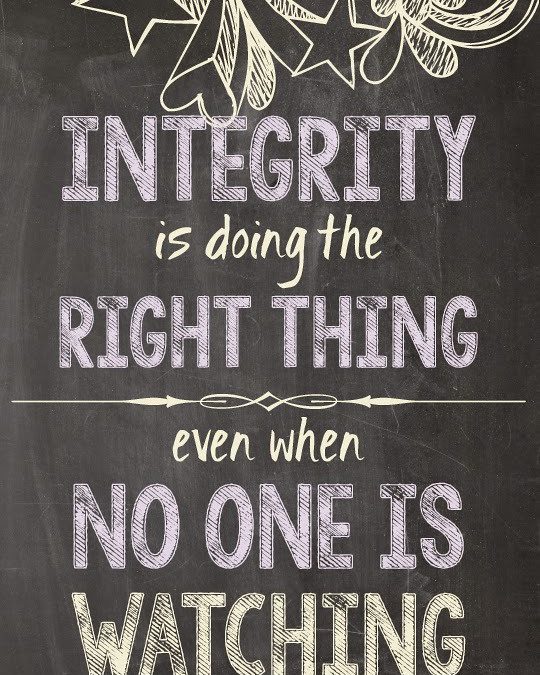“Integrity is doing the right thing even when no one is watching.” – C.S. Lewis
Integrity – the Key to Individuation
I will never forget the day that I was presented with the concept of “integrity”. It was early in one of my Jungian analyses. For several years, I had been tiptoeing around a core issue.
That particular morning, I woke up resolved to come clean about a nasty and unpleasant side of myself – or at least that is what I thought. As I climbed the rickety old wood stairs leading to my analyst’s 3rd-floor office, the shame intensified with each step. By the time, I sat in the chair across from her, I needed to muster all my courage to admit the thing that I would do anything not to admit.
After I finally did, my analyst was quiet for a long time. Her face was calm and peaceful. My anxiety deepened with each passing second. My mind was racing anticipating all the things that she could possibly say in response. Then, she threw a monkey wrench into my psyche – a proverbial stick in the wheels of my habitable thinking. “Yes, I have known this for a while.” After a slight pause, she said “What I remember the most about people is the integrity that they bring to the work.”
What! I thought I had done a pretty good job of hiding out. It was a rude awakening to realize that it was evident to her.
It was years later when I was writing my thesis and reflecting on Jung’s ethical confrontation with the unconscious that my analyst’s words and underlying compassion began to carve their way into my heart. They nurtured the compassion and loving kindness that I have for anyone (including myself) who must painfully acknowledge the shameful aspects of themselves – the SHADOW.
What is Integrity?
We often think of integrity as meaning moral uprightness or the ability to make “good” choices and do the “right thing.” However, this perspective only creates a false duality of right and wrong, black, and white, or we and them.
It is far more than that.
Integrity, at its most basic level, is doing what you said when you said you would do it and if you can’t do that, then you come clean and re-negotiate your commitment to your word. It is about honouring commitments to oneself and others.
integrity originates from the Latin “integritas” meaning entire. The words “integrate” and “integration” also comes from this root. Pondering the etymology, we drop into a deeper level of meaning. Integrity is a process to bring together disparate elements into a complete, unbroken whole. Our wholeness is our authenticity and our true self. It is indisputable. You are either in it or not. You are either being authentic, or you are not. There is no maybe.
When we are in our integrity (AKA wholeness), what we present to the outside reflects our inside. We do not give a false impression to the people around us because of what we think is expected of us.
Without integrity and being true to ourselves, life tends not to work. Relationships certainly don’t work. At some point, you must contend with the shadow that will undermine it all.
What is the Shadow?
“Everything casts a substantial shadow,” Jung said. He believed that our conscious awareness is in the light and everything of substance which stands in the light — whether it’s a tree or an idea — casts a shadow.
We all have one and none of us see it in ourselves. We grow up in families and societies that value some characteristics over others. Some parts of ourselves are acceptable and others are not. Like the far side of the moon, the shadow is hidden from view and stands in the darkness, the side that is not lit up by the sun. It encompasses all the parts of ourselves that we hide from others. Sometimes we even hide it from ourselves.
Without integrity, an apology means nothing!
When we meet our shadow in our lives, the call of individuation demands that we acknowledge it, bring it into the light of day and accept it as our own. Many times, in the process, we need to apologize for it. How many times have we said, “That was not what I intended” because were surprised by the reaction that we got from something that we said or did? You can be sure that an aspect of our shadow was present to wreak havoc with our intentions.
The danger is that we apologize without meaning it. We think that we can appease the other and make amends by merely apologizing. However, without integrity, we know that it is hollow and without weight. A part of us whispers in the stillness of our mind – “I don’t buy that; that is not the Truth, it means nothing. Nothing! You are lying to yourself!”
For an apology to be authentic and complete, we need to offer no excuses or rationalizations, acknowledge the shadow, bring the unconscious to consciousness, access our humanity and expect nothing in return. Only then can an apology have meaning. An attitude of “apology and doing better” only avoids the shadow work of all that is hidden in the darkness.
Then we can find buried treasures and long-lost gifts that we had forgotten.
Christina Becker
March 2023
Have you found value here? Have you been inspired or moved? Please consider sharing the post on your social media networks by using the buttons below.
I love to hear your comments and ideas. Use the comments below or send me an email.
Is this your first time here? Does your soul need feeding? Are you looking for a Jungian based inspirational reflection to help with life's challenges. The Jungian Path Newsletter is a monthly reflection on the theme of the new moon. Join the list today.

